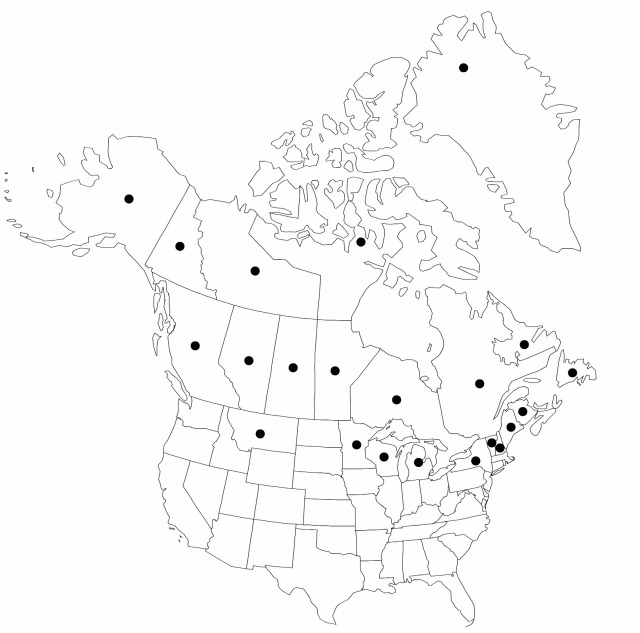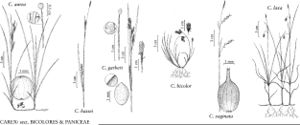Difference between revisions of "Carex vaginata"
Flora 4: 557. 1821.
FNA>Volume Importer |
FNA>Volume Importer |
(No difference)
| |
Revision as of 21:10, 16 December 2019
Plants colonial, long-rhizomatous. Culms 7–60 cm, ± smooth distally. Leaves: proximal sheaths bladeless, pale brown, slender, 0.7–2.8 mm diam., not or only very sparsely papillose; ligules 2–4.5 mm, longer than wide; blades of vegetative culms 5–40 cm × 1.5–4 mm; those of fertile culms green, flat, less than 10 cm. Inflorescences 6.5–25 cm, 2–5 times longer than proximal bracts; proximal bracts 2.5–8 cm, sheath 1–3.5 cm, blade 1–1.5 cm; pistillate spikes linear, 0.8–3 cm × 3–6.5 mm. Pistillate scales purple tinged, apex broadly acute or obtuse. Perigynia 3–15, the proximal loosely arranged, green to dark brown, often obscurely veined, 3.5–5 × 1.5–2.2 mm, smooth; beak slender, cylindric, (0.4–)0.6–1.8(–2.2) mm. Achenes light to dark brown, 2.2–3 × 1.2–1.5 mm. 2n = 32.
Phenology: Fruiting early–mid summer.
Habitat: Calcareous swamps, boggy thickets and woods
Elevation: 30–1600 m
Distribution

Greenland, Alta., B.C., Man., N.B., Nfld. and Labr., N.W.T., Nunavut, Ont., Que., Sask., Yukon, Alaska, Maine, Mich., Minn., Mont., N.H., N.Y., Vt., Wis., Eurasia.
Discussion
M. L. Fernald (1950) pointed out that North American plants sometimes segregated as Carex saltuensis do not appear to be sufficiently distinct to warrant recognition as a separate species. T. V. Egorova (1999) recognized both C. saltuensis and C. vaginata, with two subspecies, in North America. More research is clearly needed on this complex circumpolar entity. The inclusion of C. vaginata in sect. Paniceae is uncertain. Unlike other members of the group, C. vaginata lacks papillae on abaxial leaf epidermis, peduncle, and perigynium.
Selected References
None.
